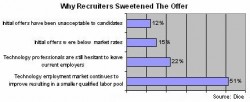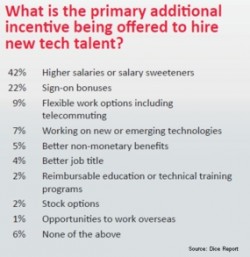 Since May, almost a third of IT recruiters have had to sweeten their offers to tech professionals in order to get them to sign on with a new company.
Since May, almost a third of IT recruiters have had to sweeten their offers to tech professionals in order to get them to sign on with a new company.
The No. 1 sweetener, as might be expected, is more money. But flexible working arrangements, including telecommuting, and commitments to new technologies, also rank high as talent attractors.
“Money is important,” says Tom Silver, senior VP/North America for Dice. But other incentives can be compelling, he adds, especially to those candidates who live in metro areas, where telecommuting might be worth more than a few extra dollars.
Workplace flexibility “is a big deal,” says Silver.
Dice released the results of a late August survey of 1,357 recruiters, consultants, and staffing firms who look for IT professionals on Dice.com.
Although 69 percent reported they haven’t needed to improve candidate offers, the other 31 percent said they have. And the No. 1 reason — cited by half of them — is that the labor pool is getting smaller as IT hiring picks up. Another 22 percent of recruiters who have sweetened their offers say they had to because “technology professionals are still hesitant to leave their current employer.”
Silver says the tightening labor market for IT is due to a pickup in hiring. Since August of 2009 Dice has seen a 40 percent increase in the number of openings advertised on the site.
Data from the U.S. Bureau of Labor Statistics bears out what Dice is reporting. In July of 2009, the job openings rate for information occupations was 1.8. A year later, it was 3.5. For the private sector as a whole in the U.S. the rate in July was 2.7, up from 2.0 a year ago. (The job openings rate is the ratio of openings divided by total employment plus the number of job openings.)
Hiring, on the other hand, is about the same as it was a year ago. The BLS puts the hiring rate at 2.6 for information workers in July versus the 2.7 rate of July 2009. For all private sector workers, the rate stood at 4.1 versus the 3.9 of July 2009.
 Those numbers suggest that IT recruiters are increasingly having a hard time finding the talent they want. Silver says that after money, a powerful attractor for tech professionals is the nature of the work and especially the opportunity to be involved with new and emerging technology.
Those numbers suggest that IT recruiters are increasingly having a hard time finding the talent they want. Silver says that after money, a powerful attractor for tech professionals is the nature of the work and especially the opportunity to be involved with new and emerging technology.
In tech, he says, “the skills and skill requirements are always changing.” Workers want to keep abreast of those changes and improve their skills, so recruiters who can offer those opportunities — the “latest and greatest,” Silver says — are at an advantage.
Indeed, the Dice survey shows that after money and flexible working arrangements, recruiters offered the opportunity to work with new technology as an incentive. Among all recruiters — those who have had to sweeten offers and those who haven’t — company culture is their favorite selling point, followed by the type of projects.
What this should mean to a recruiter is that money is important, but flexibility and challenging projects can be deal-makers.